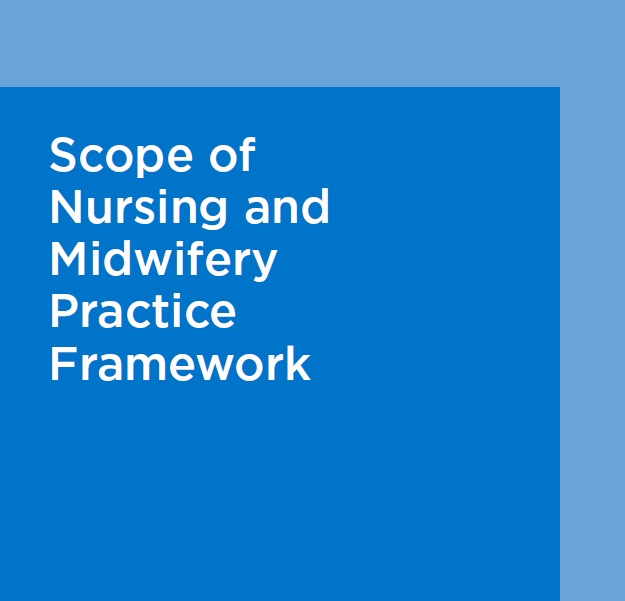Scope of Nursing and Midwifery Practice Framework: definition of scope of midwifery practice
Cnáimhseachas’ refers to the modern Irish term for midwifery. Historically in Ireland, ‘an Bhean Ghlúine’ was the midwife. The many-layered meaning of the word ‘glún’ includes depicting the midwife with the woman, both on their knees, one birthing and one supporting. Glún means ‘knee’ in this sense. It also carries the meaning of ‘generations’ – hence ‘ó ghlúin go glúin’, ‘from generation to generation’. The English word ‘midwife’ means ‘with woman.
A registered midwife is a person who:
- Has successfully completed a recognised and approved midwifery education programme in the country where the qualification was achieved
- Has acquired the necessary requirements to be registered to practise midwifery in this jurisdiction and use the title ‘registered midwife’
- Demonstrates and maintains competency in the practice of midwifery.
The scope of midwifery practice is the expected range of roles, functions, responsibilities and activities that a midwife registered with the NMBI is educated for and is competent and authorised to perform. More specifically, the scope of midwifery practice is identified in the EC Directive of 2005 (2005/36/EC) as amended.
Article 42 of the Directive (2005) states that:
The Member State shall ensure that midwives are able to gain access and pursue at least the following activities:
a) Provide sound family planning information and advice
b) Diagnose and monitor normal pregnancies; carrying out the examinations necessary to do this
c) Prescribe or advise on necessary examinations for the earliest possible diagnosis of pregnancies at risk
d) Provide parenthood preparation programmes and provide preparation for childbirth advice, including advice on hygiene and nutrition
e) Care for and help the mother during labour and monitor the condition of the baby in the womb using appropriate clinical and technical means
f) Conduct spontaneous deliveries, including, where required, episiotomies, and in urgent cases breech deliveries; recognise the warning signs of abnormality in the mother or baby’s condition which need to be referred to a doctor, and assist the doctor if necessary. The midwife should also take the necessary emergency measures in the doctor’s absence, in particular, the manual removal of the placenta, possibly followed by manual examination of the womb
g) Examine and care for the newborn infant and take all initiatives that are needed, including resuscitation, if necessary
h) Care for and monitor the progress of the mother in the post-natal period and advise her on infant care so that the baby makes the best possible progress
i) Carry out the treatment prescribed by doctors
j) Draw up the necessary written reports
Fundamental to midwifery practice is the provision of safe, competent, kind and compassionate care which is informed by the best available evidence; the midwife’s own expertise; and the experiences, preferences and values of the woman. Midwifery practice is underpinned by values that guide the way in which midwives provide care. The Nursing and Midwifery Board of Ireland considers that the following values should underpin midwifery practice and provide the basis for the formulation of a philosophy of midwifery:
These values are also shared with the International Confederation of Midwives.
- Having a baby is a profound experience; which carries intense meaning to the woman, her baby, her family and the community.
- The woman is the primary decision-maker in her care and she has the right to information that helps her to make decisions.
- Birth is a normal physiological process.
- Midwives are the most appropriate care providers to attend women during pregnancy, labour, birth and the post-natal period and in collaboration with other health care professionals when required.
- Midwives respect all people equally without discriminating on the grounds of age, gender, race, ethnicity, religion, civil status, family status, sexual orientation, disability (physical, mental or intellectual), or membership of the Traveller community.
- Midwives value empowerment of women to assume responsibility for their health and for the health of their families.
- Midwifery care combines art and science. Midwifery care is holistic in nature - grounded in an understanding of the social, emotional, cultural, spiritual, psychological and physical experiences of women, and is based upon the best available research and experiential evidence.
- Midwives have confidence and trust in, and respect for women and their capabilities in childbirth.
- Midwifery practice must always be based on the principles of professional conduct as stated in the Code of Professional Conduct and Ethics for Registered Nurses and Registered Midwives.
An individual midwife’s scope of practice is dynamic – that is, it will change and grow as they progress in their career.
The scope of practice of the individual midwife is influenced by a number of factors including:
- The midwife’s educational preparation, experience and competence
- Local, national and international guidelines, polices and evidence base
- The practice setting
- Collaborative practice
- Other factors such as the woman and baby’s safety, their needs and care outcomes.

Scope of Nursing and Midwifery Practice Framework
(PDF, 0.76 MB)
Download